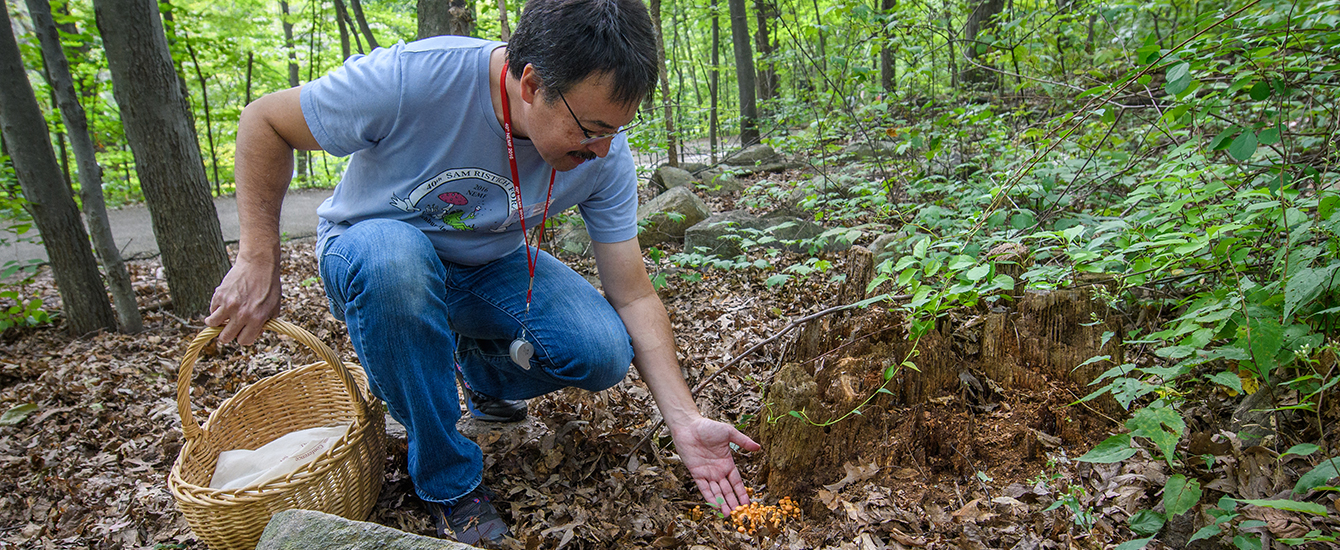Biology
Our faculty are interested in a wide range of organisms and research areas. They have received funding from the John Templeton Foundation, the National Institutes of Health, the National Science Foundation, and other prestigious funding agencies and foundations.
Areas of Research include:
- Animal behavior
- Bioinformatics
- Cell biology
- Development
- Ecology
- Evolution
- Genetics
- Marine biology
- Molecular biology
- Molecular evolution/systematics
- Neuroscience
- Physiology
- Population biology
- Signal Transduction
Submissions from 2024
Many-to-many mapping: A simulation study of how the number of traits and tasks affect the evolution of form and function, Philip Bergmann and Isabel Tonelli-Sippel
A genotyping array for the globally invasive vector mosquito, Aedes albopictus, Luciano Veiga Cosme, Margaret Corley, Thomas Johnson, Dave W. Severson, Guiyun Yan, Xiaoming Wang, Nigel Beebe, Andrew Maynard, Mariangela Bonizzoni, Ayda Khorramnejad, Ademir Jesus Martins, José Bento Pereira Lima, and Todd P. Livdahl
The effects of land use change on ant communities in New England, Amelia K.L. Curry, Joseph A. Nelsen, Dale R. Stevens, and Kaitlyn A. Mathis
Transcription factor expression landscape in Drosophila embryonic cell lines, Robert A. Drewell, Daniel Klonaros, and Jacqueline Dresch
The effect of urbanization and temperature on thermal tolerance, foraging performance, and competition in cavity-dwelling ants, Brooke A. Harris, Dale Stevens, and Kaitlyn A. Mathis
Sulfur assimilation using gaseous carbonyl sulfideby the soil fungus Trichoderma harzianum, Ryuka Iizuka, Shohei Hattori, Yusuke Kosaka, Yoshihito Masaki, Yusuke Kawano, Iwao Ohtsu, David Hibbett, Yoko Katayama, and Makoto Yoshida
An exploration of how plant and soil characteristics shape the Hypericum perforatum microbiome in three habitats, Renee H. Petipas, Steven A. Higgins, Chantal Koechli, Spencer J. Davenport, Chandra Jack, Monica A. Geber, and Daniel A. Buckley
The role of ant-mediated biological interactions in agroecosystems, Madison Sankovitz, Monique J. Rivera, Tobias Manjarress, and Kaitlyn A. Mathis
Phylogenomics reveals extensive misidentification of fungal strains from the genus Aspergillus, Jacob L. Steenwyck, Charu Balamurugan, Huzefa A. Raja, Carla Gonçalves, Ningxiao Li, Frank Martin, Judith Berman, Nicholas H. Oberlies, John G. Gibbons, Gustavo H. Goldman, David M. Geiser, Jos Houbraken, David Hibbett, and Antonis Rokas
Herptile gut microbiomes: a natural system to study multi-kingdom interactions between filamentous fungi and bacteria, Lluvia Vargas-Gastélum, Alexander S. Romer, Marjan Ghotbi, Jason W. Dallas, Reed. N. Alexander, Kylie C. Moe, Kerry L. McPhail, George F. Neuhaus, Leila Shadmani, Joseph W. Spatafora, Jason E. Stajich, Javier F. Tabima, and Donald M. Walker
Capitella teleta gets left out: possible evolutionary shift causes loss of left tissues rather than increased neural tissue from dominant-negative BMPR1, Nicole B. Webster and Néva P. Meyer
Population-level immunologic variation in wild threespine stickleback (Gasterosteus aculeatus), Anika M. Wohlleben, Javier F. Tabima, Néva P. Meyer, and Natalie C. Steinel
Submissions from 2023
New tRNA-targeting transposons that hijack phage and vesicles, Emily Dart and Nathan A. Ahlgren
Diverse Marine T4-like Cyanophage Communities Are Primarily Comprised of Low-Abundance Species Including Species with Distinct Seasonal, Persistent, Occasional, or Sporadic Dynamics, Emily Dart, Jed A. Fuhrman, and Nathan A. Ahlgren
Investigating the sequence landscape in the Drosophila initiator core promoter element using an enhanced MARZ algorithm, Jacqueline Dresch, Regan D. Conrad, Daniel Klonaros, and Robert Drewell
The Dictyostelium discoideum genome lacks significant DNA methylation and uncovers palindromic sequences as a source of false positives in bisulfite sequencing, Robert Drewell, Tayla C. Cormier, Jacob L. Steenwyk, James St Denis, Javier F. Tabima, Jacqueline Dresch, and Denis A. Larochelle
Vertical habitat stratification in Aedes triseriatus and Aedes hendersoni (Diptera: Culicidae): complications associated with sloped and flood-prone landscapes, Jamie Fitzgerald and Todd P. Livdahl
Transcriptome profile in Drosophila Kc and S2 embryonic cell lines, Daniel Klonaros, Jacqueline M. Dresch, and Robert A. Drewell
Comparative Genomic Analysis of 31 Phytophthora Genomes Reveals Genome Plasticity and Horizontal Gene Transfer, Brent A. Kronmiller, Nicolas Feau, Danyu Shen, Javier F. Tabima, Shahin S. Ali, Andrew D. Armitage, Felipe Arredondo, Bryan A. Bailey, Stephanie R. Bollmann, Angela Dale, Richard J. Harrison, Kelly Hrywkiw, Takao Kasuga, Rebecca McDougal, Charlotte F. Nellist, Preeti Panda, Sucheta Tripathy, Nari M. Williams, Wenwu Ye, Yuanchao Wang, Richard C. Hamelin, and Niklaus Grünwald
Transcriptomics of Temporal- versus Substrate-Specific Wood Decay in the Brown-Rot Fungus Fibroporia radiculosa, Byoungnam Min, Steven Ahrendt, Anna Lipzen, Cristina E. Toapanta, Robert A. Blanchette, Dan Cullen, and David Hibbett
Unraveling the functional dark matter through global metagenomics, Georgios A. Pavlopoulos, Fotis A. Baltoumas, Sirui Liu, Oguz Selvitopi, Antonio Pedro Camargo, Stephen Nayfach, Ariful Azad, Simon Roux, Lee Call, Natalia N. Ivanova, Min I. Chen, David Paez-Espino, Evangelos Karatzas, and Nathan Ahlgren
Behavioral diversity and biomechanical determinants of the outcome of a fish predator–prey interaction, Milton Q.G.A., III and Philip Bergmann
Phylogenomics reveals the history of host use in mosquitoes, John Soghigan, Charles Sither, Silvia Andrade Justi, Gen Morinaga, Brian K. Cassel, Christopher J. Vitek, Todd P. Livdahl, Siyang Xia, Andrea Gloria-Soria, Jeffrey R. Powell, Thomas Zavortink, Christopher M. Hardy, Nathan D. Burkett-Cadena, Lawrence E. Reeves, Richard C. Wilkerson, Robert R. Dunn, David K. Yeates, Maria Anice Sallum, Brian D. Byrd, Michelle D. Trautwein, Yvonne-Marie Linton, Michael H. Reiskind, and Brian M. Wiegmann
Rapid New Diagnostic LAMP (Loop-Mediated Isothermal Amplification) Assays to Distinguish Among the Four Lineages of Phytophthora ramorum, Kelsey L. Søndreli, Javier F. Tabima Restrepo, and Jared M. LeBoldus
Evolution of chemical-cue-mediated antipredator behavior in threespine stickleback populations experiencing northern pike predation, Dale R. Stevens, Melissa A. Graham, Christina I. Bardjis, Susan A. Foster, John A. Baker, and Kaitlyn A. Mathis
Integrating environmental complexity and the plasticity-first hypothesis to study responses to human-altered habitats, Dale R. Stevens, Matthew Wund, and Kaitlyn B. Mathis
Editorial: MorphoEvoDevo: a multilevel approach to elucidate the evolution of metazoan organ systems, Andreas Wanninger, Pedro Martinez, and Néva P. Meyer
Faculty Work from 2016
Supplemental material for Reich 2016, Deborah Robertson, Hannah G. Reich, and Gretchen Goodbody-Gringley



